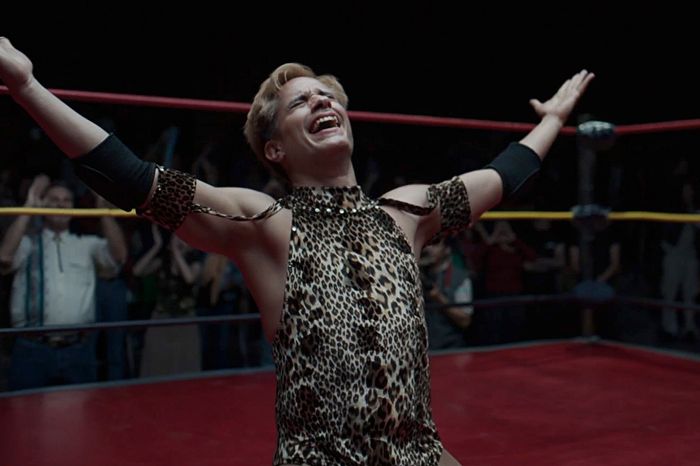
The first time that aspiring luchador Saúl Armedáriz steps into his role as the flamboyant, feminine Cassandro, he is met with hatred.
As he sidles toward the ring at a wrestling match in Juárez, Mexico, he’s met on all sides by homophobic slurs from the crowd. But Saúl/Cassandro doesn’t cower. Instead, Gael García Bernal, the actor who plays him in the biopic now in select theaters and streaming on Prime Video next week, switches on the lights behind his eyes to signify that some of this man’s internal candles are finally flickering for the first time. You want to hate me?, the glee in his expression asks. Go right ahead. You’re only giving me fuel.
This is one of several times that the eponymous main character of Cassandro transforms in front of the camera and, thanks to his somersaulting showmanship and flair for the dramatic, turns an audience of haters into fans. Like so many moments in this intimately rendered movie, it brims over with immediacy, as if we the audience have been invited to experience exactly what Saúl feels as he embraces his wrestling alter ego and a side of himself that he has spent most of his life suppressing.
Cassandro may be a biopic about the actual Saúl Armedáriz, the man who physically and metaphorically flipped the Mexican wrestling world upside down in the 1980s by becoming a new type of exótico, a queer, cross-dressing competitor who actually won matches instead of losing as preconceived outcomes typically dictated. But it’s less about what happens to Saúl and more about what it is like to walk through the world in Saúl’s skin, experiencing the paradoxical shame and exhilaration that comes from existing in the wrestling world as a gay man in the 1980s.
Director Roger Ross Williams makes his narrative-film debut with Cassandro after years of work in the documentary world; that experience serves him well. Even though wrestling itself is often highly orchestrated, nothing in this film seems staged. Ross Williams, who co-wrote the script with David Teague, editor of Ross Williams’s Life, Animated, makes every scene feel as if it were already pulsing with its own energy before the filmmakers showed up to capture it. That applies to the bluster and violence of the wrestling sequences as well as to quieter moments, when Saúl and his mother (Perla de la Rosa) comfortably share space at home or swim in the pool of a nicer house that he hopes to buy for them one day.
Hope has largely been leached out of the lives of these two, both of whom pine for the moments they used to share with Saúl’s dad, who abandoned them entirely after realizing his son is gay. “He’d still be with us if you had just listened to me,” Yocasta, Saúl’s mom, tells her only child, adding more concrete to Saúl’s already firmly established belief that his sexual orientation is a secret that must be kept. When Yocasta sees her son perform as Cassandro for the first time, she beams with pride and then grimaces, already fearful of how he might be received by hostile homophobes and his estranged father.
But despite his mother’s concerns and a seemingly doomed relationship with his fellow wrestler boyfriend (Raúl Castillo), who is married to a woman, Saúl presses forward with his attempt to integrate his two halves, a journey that García Bernal infuses with exuberance even outside of the ring. “If Cassandro were here, he’d tell you he wants to kiss you,” he whispers flirtatiously to his friend Felipe (a convincing Bad Bunny), his courage boosted by a few lines of cocaine and the rush that comes with realizing he can drop his inhibitions. “But he’s not here,” Saúl says as he backs away. The person that he wants to be is an omnipresent magnetic force he attempts to resist and sometimes surrenders to, and García Bernal understands exactly how to evoke that push and pull. It’s one of his best performances in a career filled with strong ones.
Cassandro stands among multiple recent film and television projects that have depicted wrestling from perspectives that don’t necessarily mesh with the hypermasculine stereotypes that surround it. (See also: Fighting With My Family and the TV series GLOW). Given that, it’s a shame we don’t get to spend more time with Sabrina (Roberta Colindrez), the woman who trains Saúl and wrestles herself under the name Lady Anarquía. Colindrez, always a compelling screen presence, brings enough substance to the character to suggest there could be a whole other movie to be made about her life on the circuit.
But that’s not what this movie is about. This one is a celebration of Cassandro, and like so many great sports movies before it, it’s an underdog story. But it’s one steeped in the grittiness of reality that avoids leaning too hard into easy sentimentality. Cassandro may muscle and wink his way into the spotlight, but nothing about the effort is easy. This film is as interested in the struggle as it is in the moments of triumph.
More Movie Reviews
- The Thriller Drop Is a Perfect Addition to the Bad-First-Date Canon
- The Accountant 2 Can Not Be Taken Seriously
- Another Simple Favor Is So Fun, Until It Gets So Dumb


